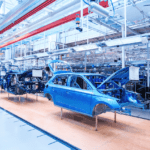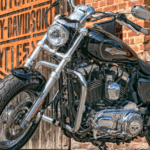

The Evolution of Sports Cars and Superbikes Culture in Pakistan
The Evolution of Sports Cars and Superbikes Culture in Pakistan
The history of sports cars and superbikes in Pakistan can be traced back to the early 2000s when the country experienced an influx of imported vehicles. Prior to this, the automotive industry in Pakistan was largely dominated by locally manufactured cars that focused more on affordability and practicality rather than performance and style.
However, with the liberalization of import policies and the growing purchasing power of the middle class, the demand for sports cars and superbikes started to rise. This led to the emergence of a niche market for high-performance vehicles, catering to the needs and desires of car and bike enthusiasts.
The initial wave of imported sports cars and superbikes consisted mainly of brands like Honda, Toyota, and Suzuki, which were already popular in the country. These vehicles offered a taste of luxury and performance that was previously unheard of in Pakistan.
As the demand for sports cars and superbikes continued to grow, more international brands started to make their way into the Pakistani market. Brands like BMW, Mercedes-Benz, Audi, and Ducati became increasingly popular among enthusiasts who were looking for a higher level of sophistication and performance.
With the increasing popularity of sports cars and superbikes, various car clubs and biking groups also started to emerge in different cities of Pakistan. These clubs provided a platform for enthusiasts to connect, share their passion, and organize events and meetups.
Over the years, the sports cars and superbikes culture in Pakistan has evolved significantly. Today, you can find a wide range of high-performance vehicles on the roads of major cities like Karachi, Lahore, and Islamabad. From sleek and stylish sports cars to powerful and adrenaline-pumping superbikes, there is something for every enthusiast.
Moreover, the rise of social media has also played a significant role in the growth of this culture. Enthusiasts can now connect with like-minded individuals, share their experiences, and showcase their vehicles and rides through platforms like Instagram, Facebook, and YouTube.
The Government’s Support and Infrastructure Development
As the sports cars and superbikes culture started to gain traction in Pakistan, it began to attract the attention of a wider audience. People from different walks of life, not just the elite, started to develop an interest in these vehicles. This led to a surge in demand for sports cars and superbikes, prompting the government to reconsider its policies regarding import duties and infrastructure.
Recognizing the potential economic benefits and the growing interest among the public, the government took steps to facilitate the import of these vehicles. Import duties were reduced, making it more affordable for enthusiasts to bring in their dream machines. Additionally, the government started investing in the development of race tracks and other infrastructure necessary for high-performance vehicles.
This shift in government policies and the growing popularity of sports cars and superbikes led to a significant increase in the number of enthusiasts and the availability of these vehicles in the country. As a result, exclusive clubs and events started to welcome a more diverse group of individuals, fostering a sense of community among enthusiasts.
With the increase in accessibility, more people began to pursue their passion for speed and adrenaline. This led to the emergence of local racing circuits and competitions, providing a platform for enthusiasts to showcase their skills and compete against each other. These events not only served as a source of entertainment but also helped in nurturing young talent and promoting the sports cars and superbikes culture in the country.
Today, the sports cars and superbikes culture in Pakistan has come a long way from its humble beginnings. It has evolved into a thriving community of passionate individuals who not only own these high-performance machines but also actively participate in various events and competitions. The government’s support, coupled with the dedication and enthusiasm of the enthusiasts, has transformed Pakistan into a destination for sports cars and superbikes enthusiasts from around the world.
The Rise of Local Talent and Future Trends
Another remarkable addition to the Pakistani sports car industry is the “Raftar,” a locally produced vehicle that has caught the attention of car enthusiasts nationwide. With its aerodynamic design and cutting-edge technology, the Raftar has become a symbol of Pakistani ingenuity and craftsmanship. This locally manufactured sports car offers a thrilling driving experience, rivaling some of the most well-known international brands in terms of performance and style.
The rise of local talent in the sports car and superbike industry can be attributed to several factors. Firstly, the increasing demand for high-performance vehicles among the younger generation has created a market opportunity for local manufacturers. As more young Pakistanis express their passion for speed and luxury, the need for affordable yet powerful sports cars and superbikes has grown exponentially.
Furthermore, the advancements in technology and access to information have allowed Pakistani engineers and designers to stay up-to-date with the latest trends in the automotive industry. Through online platforms and international collaborations, they have been able to learn from global experts and incorporate their knowledge into their own designs. This exchange of ideas has fueled the development of local sports cars and superbikes that can now compete on a global scale.
In addition to the technical expertise, the local talent has also been supported by the government and private investors. Recognizing the potential of the automotive industry in boosting the economy and creating job opportunities, the government has introduced policies and incentives to encourage local manufacturing and innovation. This has attracted both local and foreign investors who see the potential in the Pakistani market.
Moreover, the rise of local talent in the sports car and superbike industry has not only contributed to the economy but also to the national pride. Pakistani engineers and designers are now being recognized internationally for their contributions to the automotive industry. Their success stories have inspired a new generation of aspiring engineers and designers, who now have the confidence to pursue their dreams and make a mark in the global arena.
Furthermore, the advancements in technology are also playing a crucial role in shaping the future of the sports cars and superbikes culture in Pakistan. With the rapid development of electric vehicles, we can expect to see a rise in the number of electric sports cars and superbikes on the roads. These vehicles offer not only high performance but also environmental sustainability, which aligns with the global trend towards greener transportation options.
Additionally, the integration of artificial intelligence (AI) and autonomous driving features in sports cars and superbikes is revolutionizing the industry. AI-powered vehicles can analyze and adapt to driving conditions in real-time, making them safer and more efficient. This technology opens up new possibilities for thrilling racing experiences and enhances the overall driving experience for enthusiasts.
Furthermore, the future of the sports cars and superbikes culture in Pakistan is not limited to the vehicles themselves. The emergence of online communities and social media platforms dedicated to sports cars and superbikes has created a virtual space for enthusiasts to connect, share their experiences, and stay updated on the latest trends and developments. This digital revolution has brought together individuals from all walks of life who share a common passion for high-performance vehicles, fostering a sense of camaraderie and expanding the reach of the culture.
In conclusion, the future of the sports cars and superbikes culture in Pakistan is bright and promising. The government’s efforts to improve infrastructure and promote tourism, coupled with the rise of local talent and the growing community of enthusiasts, provide a solid foundation for the continued growth and development of this culture. With advancements in technology and the increasing popularity of motorsports events, we can expect to see a diverse range of high-performance vehicles on the roads, driven by passionate individuals who are pushing the boundaries of speed and innovation. The sports cars and superbikes culture in Pakistan is not just about the vehicles; it is a lifestyle, a community, and a testament to the human desire for thrill, adventure, and excellence.
Add a comment Cancel reply
Comments (0)
Categories
- automobile (1)
- Automotive (32)
- Automotive Industry (2)
- Automotive Safety (1)
- Car Brands (1)
- Car Buying (1)
- Car Reviews (1)
- Clean Energy (1)
- Marketing (1)
- Motorcycles (1)
- Trade Agreements (1)
- Transport & Mobility (1)
- Transportation (2)
- Travel (2)
Recent Posts
About us











